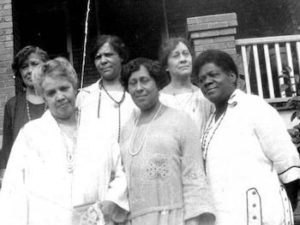
The Atlanta Neighborhood Union Members
*On this date in 1911, we celebrate the Atlanta Neighborhood Union (ANU) charter. This was a Black women-led neighborhood organization in Atlanta, Georgia.
Started in 1908 and chartered in 1911, it was "a prototype for self-help and social service organizations." ANU was one of the most important Black organizations in Atlanta's social services, working in part by networking with the city's progressive whites. One of the organizations influenced by it was the Women's Political Council of Montgomery, Alabama. It was dissolved in the 1970s. The Atlanta Neighborhood Union was founded by Lugenia Burns Hope, a social reformer and the wife of Morehouse College president John Hope. The organization was founded in June 1908 when Hope convened with eight other middle-class women.
At the time, Atlanta was "the most segregated city in Georgia," and black children did not have a place to play in Atlanta; there was "not a single playground or park for black children." Ultimately, the women got Morehouse College to give up some of its grounds for a playground. The college’s president's mansion also served as a meeting place during the organization's early years. The Union aimed to initiate settlement projects to aid underprivileged Black families. The city's neighborhoods were divided into districts, each with a board of directors responsible for investigating living conditions in its area, particularly the educational situation. It collected demographic data to identify the types of programs that would assist underprivileged citizens and quickly started classes that taught subjects such as home and personal care.
It sponsored health clinics and established after-school programs, and in 1909, it began its political activity when it petitioned the Atlanta city council "to rid the community of a house of questionable character." The Union was especially interested in education, and, in addition to providing classes, it petitioned the Atlanta Board of Education in 1913 to construct two new schools. Organizers at the district level investigated every single school and reported that they were too small, improperly ventilated, dark, and generally overcrowded. These reports and lobbying efforts led to teachers' salaries being raised and a makeshift school being built in South Atlanta. The Union started a health clinic in 1915, which examined thousands of children, enrolled parents in health classes, and had boys' and girls' clubs.
It ensured the city paved streets, provided adequate lighting and sewage treatment, and replaced dilapidated houses. In the 1920s, the Union sought to professionalize its work and, to that end, founded the Atlanta School of Social Work. During the Great Depression, it sought help from the Fulton County Relief Center but met with Jim Crow opposition from white city officials. The Union had received complaints that no Christmas gifts were given to destitute Blacks, though whites did receive such assistance. Hope confronted a city official, and after she was grudgingly granted some gifts, the official added, "The problem with it is that you people do not contribute to these things," after which she explained that blacks were tax-paying citizens just as whites were.
In the 1930s, the Union declined partly because men's organizations, such as the Atlanta Urban League, became increasingly active in social work and welfare, often employing professional workers. Still, in the early 1930s, the organization's health clinic expanded to include dental and maternal care, and it examined more than 4,000 people annually. The Union and its founder were the subjects of Jacqueline Anne Rouse's Lugenia Burns Hope, Black Southern Reformer. Recent scholarship has studied the relationship between John Hope's stereotypical masculine language and activism, the limited space it allotted his wife, and the extent to which such organizations had a "materialist" ideology. The Atlanta Neighborhood Union dissolved in the 1970s.